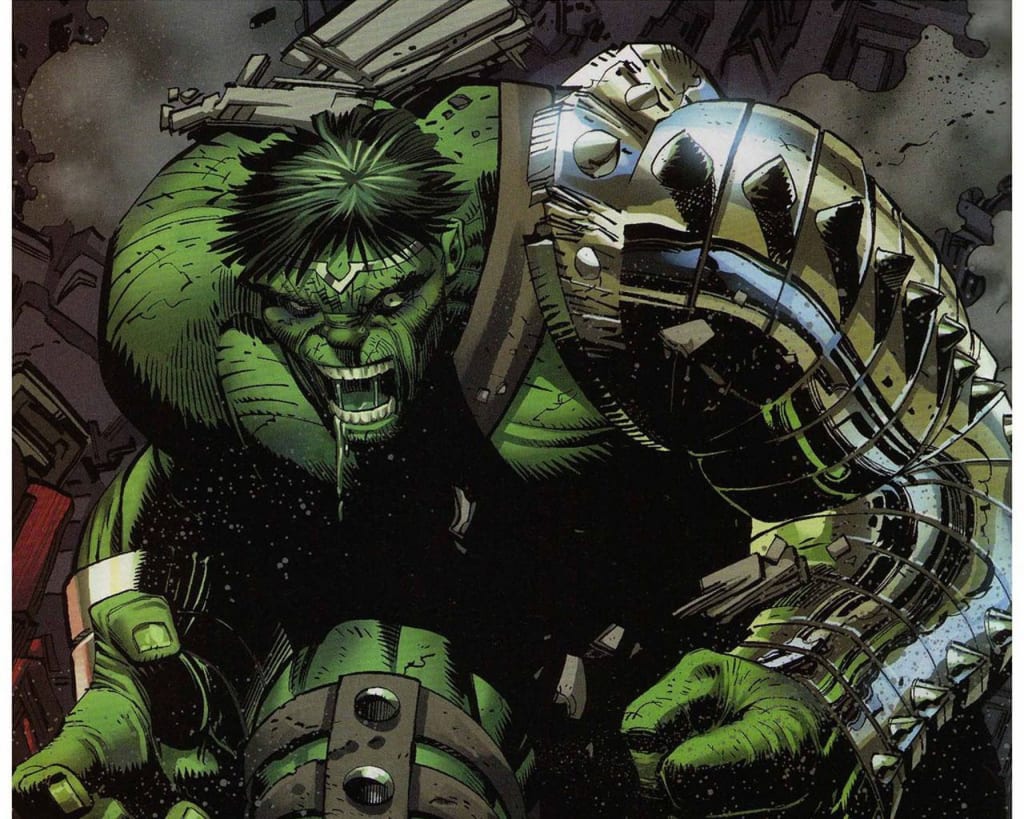
The third issue of Civil War II sent shockwaves around the world, as Marvel had one of the founding Avengers assassinated. Believing that Bruce Banner was about to Hulk out, Hawkeye shot him dead. Ironically enough, this was essentially a case of 'suicide-by-Hawkeye', as Banner had himself given the archer the weapons to put him out of his misery should Hawkeye ever deem it necessary.
All of this raises an intriguing ethical question. A normal person can only do so much damage if they go out of control, but should a superhero lash out then the cost could be phenomenal. In the worlds of superheroes and supervillains, is it ever right to take preventative measures? Are some superheroes just too powerful to live? Let's look at a few examples and see...
THE HULK
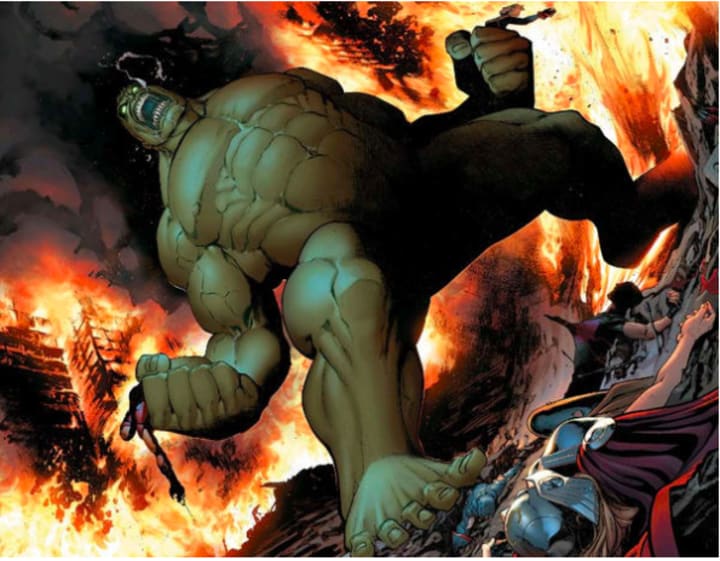
The vision that kicked it all off!
Since Bruce Banner's death is the one that started this ball rolling, let's examine the Hulk. The most disturbing side of the Hulk is that the very act of Hulking out means Bruce Banner has lost control; he turns into the Hulk when he's angry. As a creature of rage and anger, the Hulk then lashes out.
The Hulk's been blamed for countless acts of destruction. He's burned Las Vegas to the ground several times, for example, and a fight with the Hulk has often seemed to be a 'baptism-by-fire' for new superheroes - that's how often he's gone rogue! Matters came to a head in "World War Hulk", where the Hulk was at the forefront of an alien invasion that took New York City. He successfully captured some of the world's greatest superheroes, including the Inhuman monarch Black Bolt (later revealed to have been replaced by a Skrull imposter), and bested most of the remaining superheroes.
That arc led to a head-to-head, one-on-one battle between the Hulk and the Sentry. As part of that fight, the Hulk's rage built to the point where a single stamp of his foot caused earthquakes across the whole Eastern Seaboard. We were told that one more stamp on that scale would have literally sent the East Coast into the sea. That's how out-of-control he was at that point.
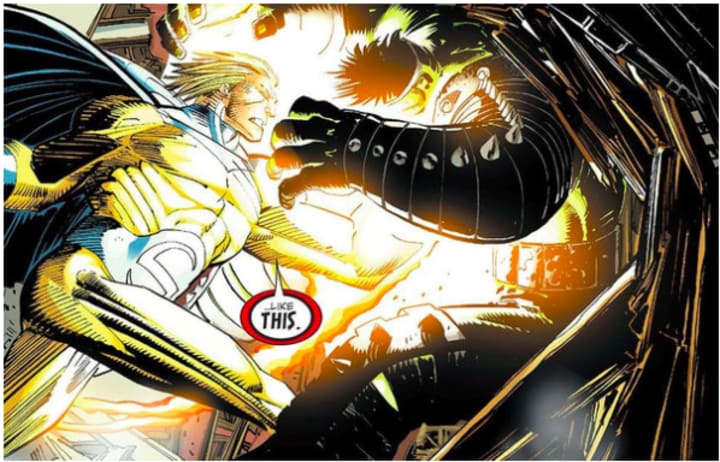
The Sentry takes on the Hulk!
But the Hulk isn't the only one who's a danger. When in human form, Bruce Banner is one of the smartest men in the room - and also one of the most mentally unstable. When Banner and the Hulk were separated at one point, Banner pretty much became a bona fide supervillain. His genius is unparalleled, and he also shows few ethical constraints when experimenting. It's worth noting that his latest experiments with Gamma treatments involved experimenting upon himself, and he didn't trouble to go to any of his scientist friends to have his work checked. He knew what he was messing with, and he was too arrogant to involve other scientists in his work. Making matters worse, there have also been suggestions that this kind of Gamma experimentation is in fact illegal in the Marvel Universe; nobody wants another Hulk, after all.
So you have a brilliant but unethical scientist conducting illegal experimentation upon himself, with a history of said experimentation leading to entire cities being levelled. Guided by a vision of the future in which Banner had Hulked out once again, it's no wonder Marvel's superheroes were so concerned. I can see a strong argument that Bruce Banner had become too dangerous to live.
SUPERMAN
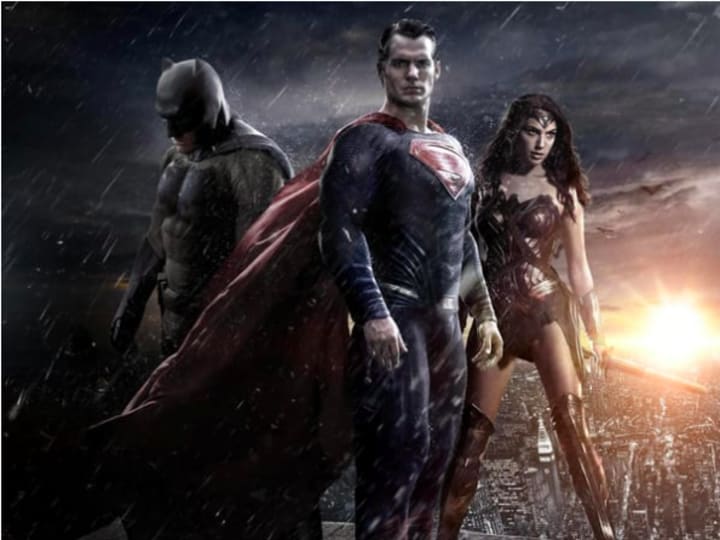
A question raised in Batman v Superman...
Ironically enough, the Hulk isn't the first superhero to face this question this year. In Batman v Superman: Dawn of Justice, Batman felt that if there was even a shadow of a chance that Superman could go rogue - then he had to be put down.
You can see where Batman's coming from. In the DC Extended Universe, Superman has become a divisive figure. He wields vast power, but seems answerable to no-one. The films show us a world that knows Superman's alien origin from the start, and that sees the threat rogue Kryptonians can pose before Superman even steps into the spotlight. As the trailer to Suicide Squad asked, if Superman decided to fly into the White House and take the President with him, who would be there to stop him? Literally the only thing protecting the world is Superman's moral code; and, given that he tends to fly into a crisis, do good, and fly off again, that moral code would be more a subject of debate than a matter of established fact.
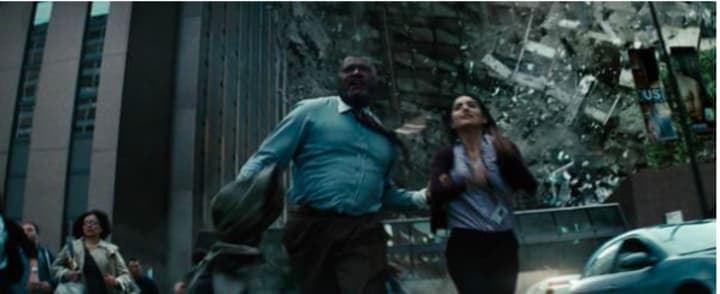
The destruction from Man of Steel.
DC's popular video game Injustice: Gods Among Us - supported by comics that flesh out the backstory - gives us a glimpse of an alternate timeline in which Superman went rogue. The Joker pushed Superman's buttons in a particularly nasty way, and Superman lashed out, murdering the Joker. He then established a new world government, taking control of the planet in order to eliminate conflict, and gradually began to fall farther than ever before. His moral code shattered, he became a man who would murder powerless opponents, and inspired an insurgency against his rule. This is what Superman can become if his moral code is broken.
I can see Batman's point. If we felt someone had the power to literally take over the world single-handed, how comfortable would we be leaving them with that power? For Superman, that power is simply who he is.
JEAN GREY
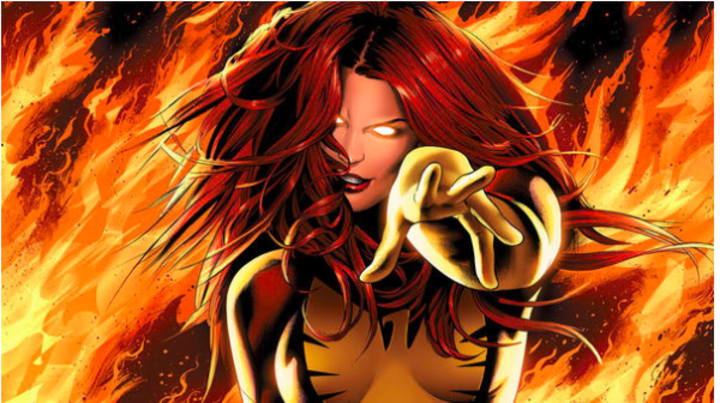
Behold - the Dark Phoenix!
Brian Bendis, writer of the main Civil War II book, has dealt with this question once before - but to understand it, you have to understand X-Men history. The mutant Jean Grey is one of the most powerful psychics in the Marvel Universe, and became inextricably tied to the Phoenix Force, a cosmic power of death and rebirth. At one point the Phoenix Force - in the form of Jean Grey - went on a rampage that literally included an act of galactic genocide, as she triggered a supernova in an inhabited star-system. More recently, during the "Avengers versus X-Men" event, the Phoenix Force swept across the galaxy and destroyed countless inhabited star-systems, before settling on Earth and reigniting the mutant race.
Jean Grey has an affinity for the Phoenix Force that goes beyond anyone else in history. Where others are hosts, she is referred to as the 'prime host', and the Phoenix Force is forever bound to her.
Over in the pages of All-New X-Men, Bendis brought the original X-Men - including Jean Grey - into the present day. When the galactic Shi'ar Empire learned teen Jean was in the present day, they stole her away from Earth and put her on trial. Underlying this was a simple fear: could they afford a teenager to be tied to the Phoenix Force once again? What would be the cost to the world if she fell, as the Phoenix had fallen in Jean's form before? You could literally be talking the deaths of entire star-systems.
MATTHEW MALLOY
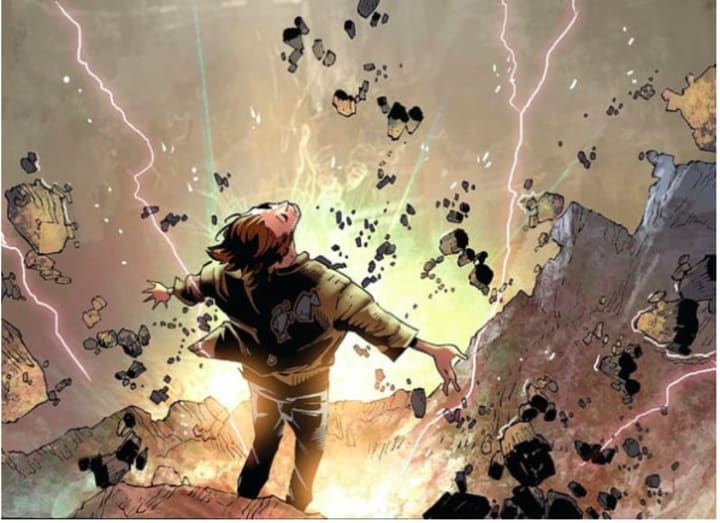
Matthew Malloy - too powerful!
Let's use one other example: Matthew Malloy. In "The Last Will and Testament of Charles Xavier," Bendis revealed that Charles Xavier had secreted away the world's most powerful mutant. It was unclear what Malloy's powers were, but, without Xavier's telepathic manipulation, Malloy's powers began to re-emerge. He instantly vaporized a town.
Matters escalated, with Malloy downing a S.H.I.E.L.D. Helicarrier (it's traditional for any powerful being to do that as an illustration of their might). S.H.I.E.L.D.'s counter-attack led to the death of Cyclops, and a grief-stricken Emma Frost lashed out at Malloy. His response obliterated the Jean Grey School, killing the X-Men.
Things were only put right by the time-travelling mutant named Tempus. Tempus travelled back to the moment in time when Malloy's parents met, and prevented that ever happening. As a result, Malloy was never born, and the timeline adjusted itself. This whole catastrophic chain of events never happened. It was a good thing, too; Malloy was on a course that could easily have led to the destruction of the world, and no power on Earth - not even the mightiest of the Avengers - could have stood against him.
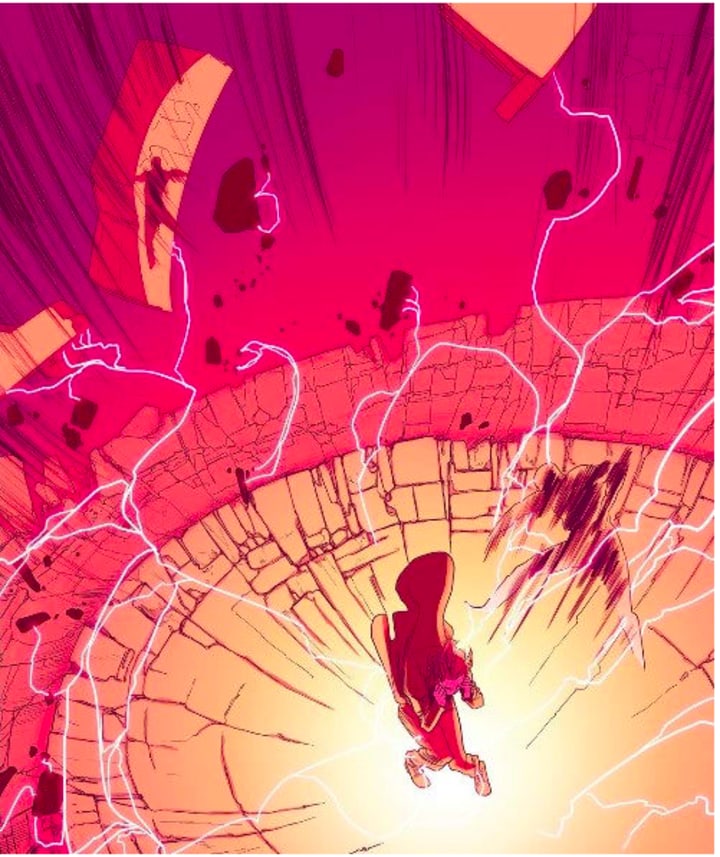
Malloy's powers flare out of control.
I've used these four examples to illustrate the point. It's easy to condemn Hawkeye for his proactive stance, but the reality is that the comic book worlds aren't the same as our own; in the Marvel and DC universes, people must deal with the fact that some men and women have world-breaking powers. From an ethical point of view, is it right that such power be concentrated in the hands of so few? If certain superheroes have a history of lashing out (as in the case of the Hulk), or if they have the irremovable potential to literally conquer the planet (as in the case of Superman), are they not too dangerous to live?
About the Creator
Tom Bacon
A prolific writer and film fan, Tom has a deep love of the superhero genre.


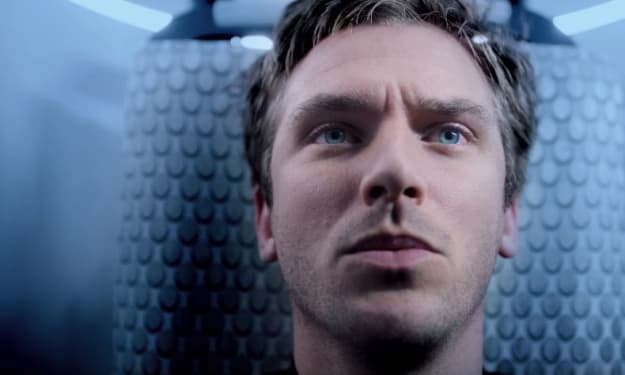

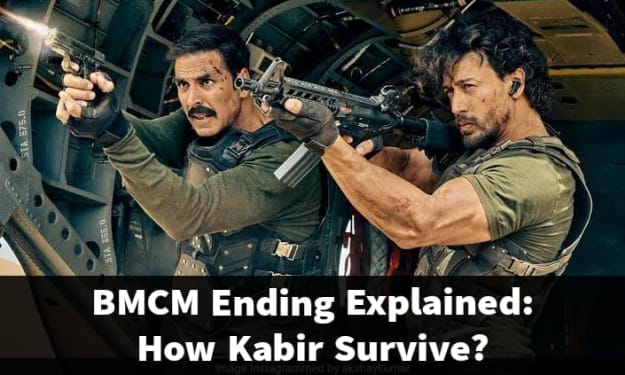

Comments
There are no comments for this story
Be the first to respond and start the conversation.